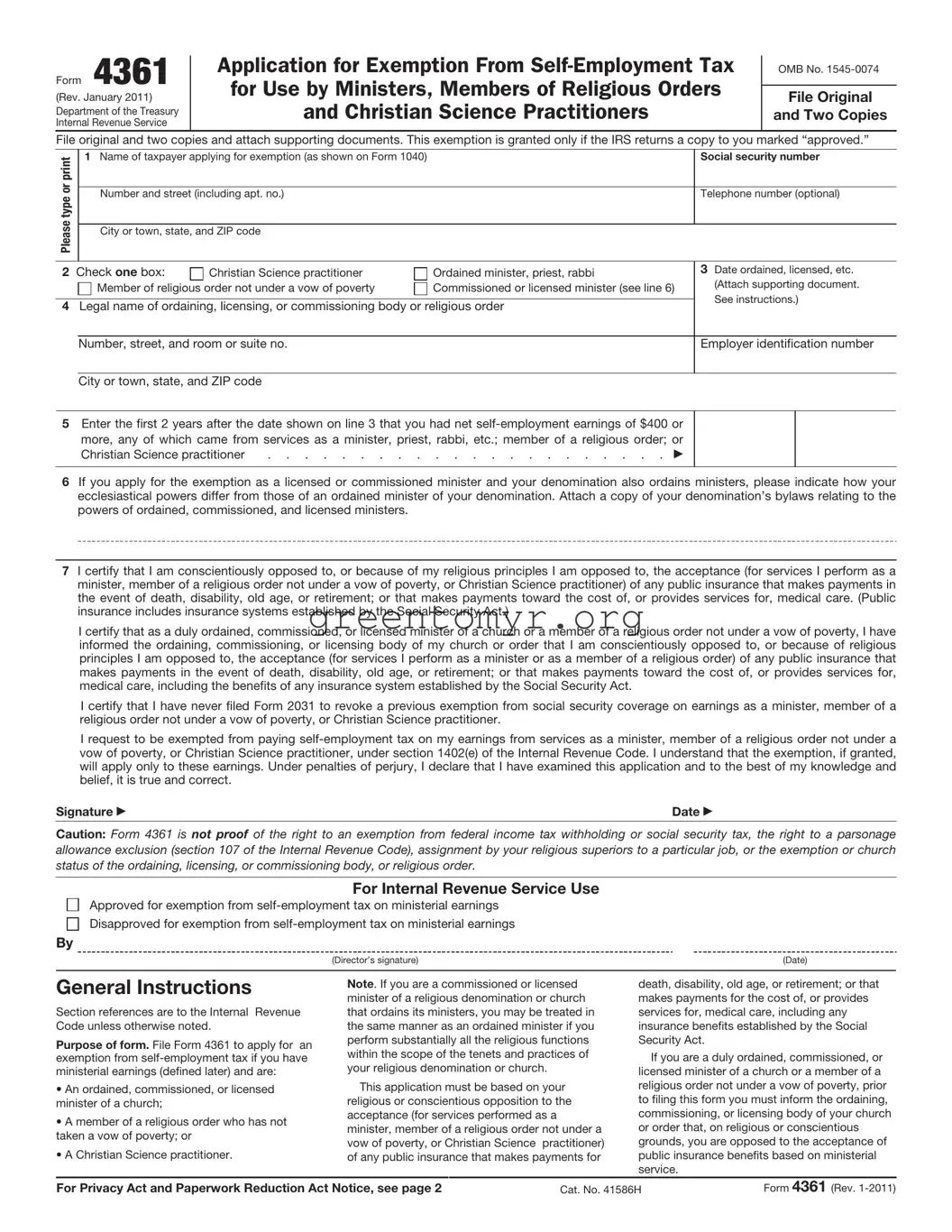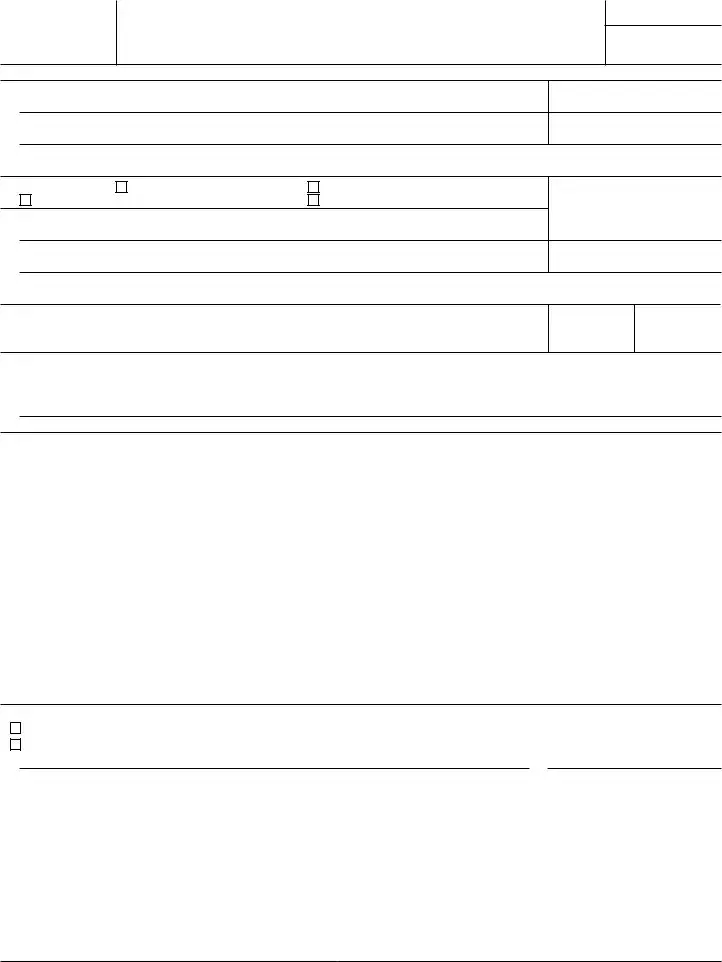Ministerial service, in general, is the service you perform in the exercise of your ministry, in the exercise of the duties required by your religious order, or in the exercise of your profession as a Christian Science pracitioner. Ministerial earnings are the self-employment earnings that result from such service. See Pub. 517 for details.
Do not file Form 4361 if:
•You ever filed Form 2031, Revocation of Exemption From Self-Employment Tax for Use by Ministers, Members of Religious Orders, and Christian Science Practitioners; or
•You belong to a religious order and took a vow of poverty. You are automatically exempt from self-employment tax on earnings for services you perform for your church or its agencies. No tax exemption applies to earnings for services you perform for any other organization.
Additional information. See Pub. 517, Social Security and Other Information for Members of the Clergy and Religious Workers.
When to file. File Form 4361 by the due date, including extensions, of your tax return for the second tax year in which you had at least $400 of net earnings from self-employment, any of which came from ministerial services.
Effective date of exemption. An exemption from self-employment tax is effective for all tax years ending after 1967 in which you have net self-employment earnings of $400 or more if you receive any of it from ministerial services. For example, if you had qualified net earnings of $400 or more in 2008 and not again until 2010, a valid Form 4361 filed by April 15, 2011, would apply to 2008 and all later years. See Pub. 517 to find out if you are entitled to a refund of self- employment tax paid in earlier years.
Where to file. Mail the original and two copies of this form to: Department of the Treasury, Internal Revenue Service Center, Philadelphia, PA 19255-0733.
Approval of application. Before your application can be approved, the IRS must verify that you are aware of the grounds for exemption and that you want the exemption on that basis. When your completed Form 4361 is received, the IRS will mail you a statement that describes the grounds for receiving an exemption under section 1402(e). You must certify that you have read the statement and seek exemption on the grounds listed on the statement. The certification must be made by signing a copy of the statement under penalties of perjury and mailing it to the IRS not later than 90 days after the date the statement was mailed to you. If it is not mailed by that time, your exemption will not be effective until the date the signed copy is received by the IRS.
If your application is approved, a copy of Form 4361 will be returned to you marked “approved.” Keep this copy of Form 4361 for your permanent records. Once the exemption is approved, you cannot revoke it.
Exempt earnings. Only earnings from ministerial services (ministerial earnings) are exempt from self-employment tax.
Conducting religious worship services or ministering sacerdotal functions are ministerial services whether or not performed for a religious organization.
Ministerial services also include controlling, conducting, and maintaining religious organizations (including religious boards,
societies, and other agencies integral to these organizations) under the authority of a church or church denomination.
If your church assigns or designates you to perform services for an organization that is neither a religious organization nor an integral agency of a religious organization, you are performing ministerial services even though they may not involve conducting religious worship or ministering sacerdotal functions. Your services are ordinarily not considered assigned or designated by your church if any of the following is true.
•The organization for which you perform the services did not arrange with your church for your services.
•You perform the same services for the organization as other employees not designated as you were.
•You perform the same services before and after the designation.
Nonexempt earnings. Exemption from self- employment tax does not apply to earnings from services that are not ministerial.
Earnings from the following entities are not exempt even if religious services are conducted or sacerdotal functions are ministered: the United States; a state, territory, or possession of the United States; the District of Columbia; a foreign government; or a subdivision of any of these bodies. For example, chaplains in the U.S. Armed Forces are considered commissioned officers, not ministers. Similarly, chaplains in state prisons or universities are considered civil servants.
Indicating exemption on Form 1040. If the IRS returns your application marked “approved” and your only self-employment income was from ministerial services, enter “Exempt—Form 4361” on the self-employment tax line in the Other Taxes section of Form 1040. If you had other self-employment income, see Schedule SE (Form 1040).
Specific Instructions
Line 3. Enter the date you were ordained, commissioned, or licensed as a minister of a church; became a member of a religious order; or began practice as a Christian Science practitioner. Do not file Form 4361 before this date. Attach a copy of the certificate (or, if you did not receive one, a letter from the governing body of your church) that establishes your status as an ordained, commissioned, or licensed minister; a member of a religious order; or a Christian Science practitioner.
Line 4. If you are a minister or belong to a religious order, enter the legal name, address, and employer identification number of the denomination that ordained, commissioned, or licensed you, or the order to which you belong. Get the employer identification number from your church or order.
You must be able to show that the body that
ordained, commissioned, or licensed you, or your religious order, is exempt from federal income tax under section 501(a) as a religious organization described in section 501(c)(3). You must also be able to show that the body is a church (or convention or association of churches) described in section 170(b)(1)(A)(i). To assist the IRS in processing your application, you can attach a copy of the exemption letter issued to the organization by the IRS. If that is not
available, you can attach a letter signed by an individual authorized to act for the organization stating that the organization meets both of the above requirements.
Privacy Act and Paperwork Reduction Act Notice. We ask for the information on this form to carry out the Internal Revenue laws of the United States. We need this information to ensure that you are complying with these laws and to allow us to figure and collect the right amount of tax. Applying for an exemption from self-employment tax is voluntary. However, providing the requested information is mandatory if you apply for the exemption. Our legal right to ask for the information requested on this form is Internal Revenue Code sections 1402(e), 6001, 6011, 6012(a), and 6109 and their regulations. Code section 6109 requires that you provide your social security number on what you file. If you fail to provide all or part of the information requested on Form 4361, your application may be denied. If you provide false or fraudulent information, you may be subject to penalties.
You are not required to provide the information requested on a form that is subject to the Paperwork Reduction Act unless the form displays a valid OMB control number. Books or records relating to a form or its instructions must be retained as long as their contents may become material in the administration of any Internal Revenue law.
Generally, tax returns and return information are confidential, as stated in section 6103. However, section 6103 allows or requires the Internal Revenue Service to disclose or give the information shown on your tax return to others as described in the Code. We may disclose this information to the Social Security Administration for administration of the exemption, to the Department of Justice to enforce civil and criminal tax laws, and to cities, states, the District of Columbia, and U.S. commonwealths or possessions to administer their tax laws. We may also disclose this information to other countries under a tax treaty, to federal and state agencies to enforce federal nontax criminal laws, and to federal law enforcement and intelligence agencies to combat terrorism.
Please keep this notice with your records. It may help you if we ask you for other information. If you have any questions about the rules for filing and giving information, please call or visit any Internal Revenue Service office.
The average time and expenses required to complete and file this form will vary depending on individual circumstances. For the estimated averages, see the instructions for your income tax return.
If you have suggestions for making this form simpler, we would be happy to hear from you. You can write to the Internal Revenue Service, Tax Products Coordinating Committee, SE:W:CAR:MP:T:T:SP, 1111 Constitution Avenue, NW, IR-6526, Washington, DC 20224. Do not send the form to this address. Instead, see Where to file on this page.


